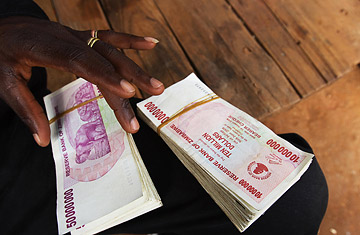
Bowing to a request from the German government, a German company that has been supplying Zimbabwe's embattled regime with bank note paper has stopped its deliveries, further increasing pressure on President Robert Mugabe.
The Munich-based firm Giesecke & Devrient, which reportedly supplies about half the southern African country's skyrocketing needs for paper to print money, made the decision after its president received a phone call Tuesday from German Foreign Minister Frank-Walter Steinmeier.
"We have taken this step in response to an official request from the German government and calls for sanctions on Zimbabwe from the European Union," Heiko Witzke, a company spokesman, said Wednesday.
A Foreign Ministry spokeswoman said that in his call to CEO Karsten Ottenberg, Steinmeier underlined the deteriorating situation in Zimbabwe and the mounting calls for stiffer sanctions on the Mugabe regime. She said the ministry had been holding talks with the company for several weeks.
Germany's development minister, Heidemarie Wieczorek-Zeul, had written to the company last week asking that it stop its "terrible" dealings with Mugabe, who was sworn in Sunday after he stood as the only candidate for reelection. Protesters brandishing placards saying "No cash for terror" also demonstrated outside the firm's headquarters last week.
Zimbabwe's opposition movement has been brutally suppressed and its candidate, Morgan Tsvangirai, withdrew from the presidential contest prior to the vote, citing violence and intimidation.
Hyperinflation, estimated at 1 million to 2 million percent per year, is running rampant in the economically devastated country. Zimbabwe's central bank cannot keep up with the demand for ever larger bills and the paper to print them on.
Bank note denominations now run to 75 billion Zimbabwean dollars. A pint of milk, if it can be found at all, can now cost 3 billion dollars, or about 30 U.S. cents.
The company's code of conduct states that its products and services "contribute to the social progress and technological advancement of society." Asked whether supplying a government widely regarded as despotic with paper for its currency violated that code, the spokesman said Giesecke & Devrient did not involve itself in "political" issues. "The important point is that it's not up to us to rely on political considerations in supplying bank note paper," he said. "We only deliver to central banks, not regimes."
The German company, whose slogan is "creating confidence," supplies central banks and governments in nearly 100 countries with high-security paper for bank notes and other financial instruments. Its 2007 sales were $2.46 billion. In its annual report, the company stated that its bank note business with African countries had been especially successful. Giesecke & Devrient said World Bank regulations prohibited it from revealing details of its contracts with Zimbabwe.
Citing a bill issued to a Harare printing firm, Munich's Süddeutsche Zeitung reported that in March, Giesecke & Devrient delivered bank note paper worth $856,000 to Zimbabwe. The spokesman would neither confirm nor deny the figure.
The family-owned firm once supplied the Weimar government of 1920s Germany with paper for its currency at a time of hyperinflation, and also printed the tickets for the 1936 Olympics during the Third Reich. Its current business also includes smart-card technology, integrated chips to store biometric data and border-control systems.
